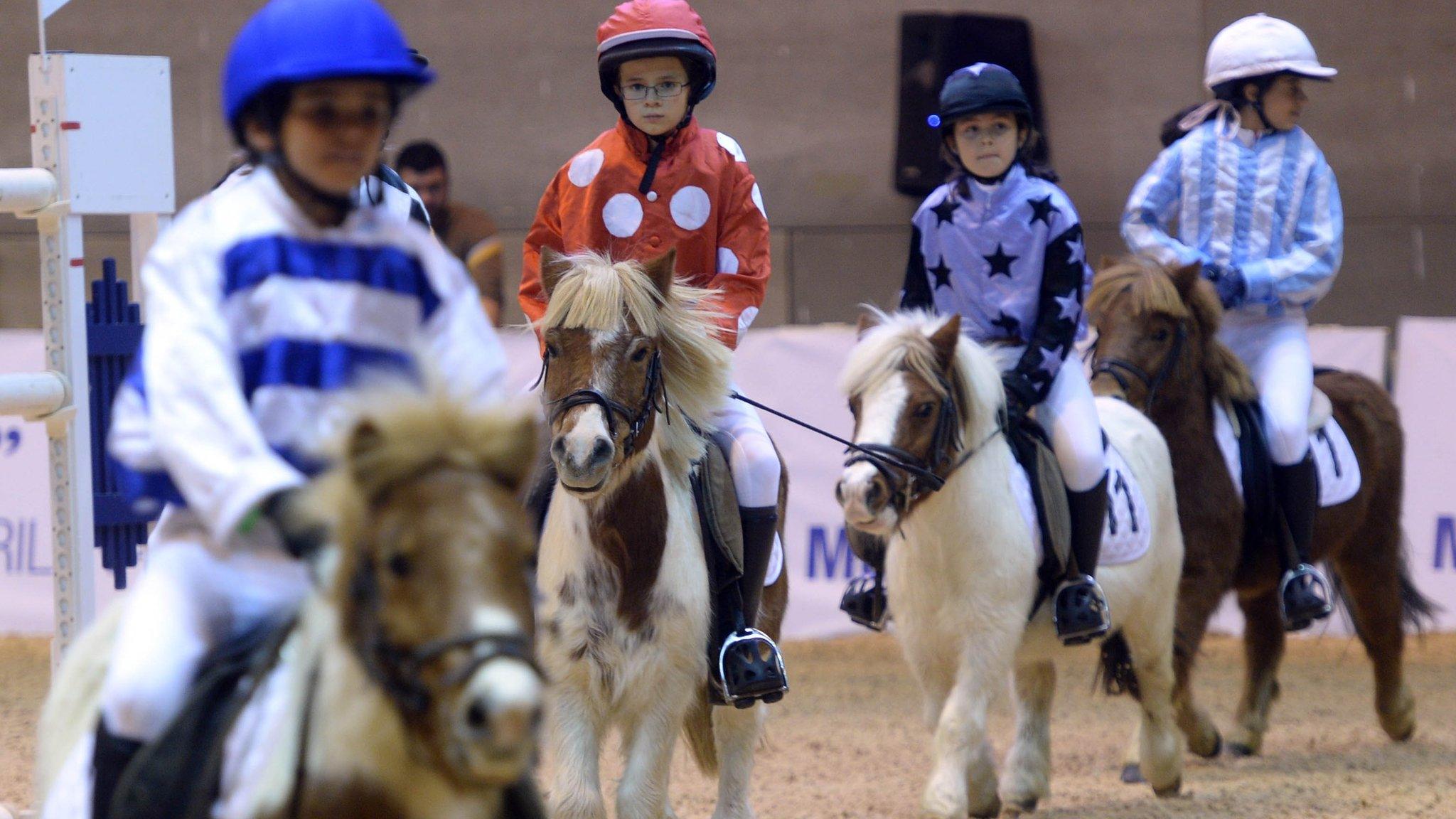Epsom Derby: Galileo heads Coolmore Stud stallion team
- Published
Archive: Inside the Coolmore stud farm (2014)
A sporting champion in his own right, he has helped make many others. The super stud Galileo really is the daddy when it comes to breeding winners.
Father of the mighty Frankel, he will have several sons running in the Derby at Epsom on Saturday, including the hot favourite Australia.
Arguably the world's most sought-after stallion, the powerfully built horse takes it all in his stride as he parades in the luxurious surroundings of his Irish home at the Coolmore Stud in County Tipperary.
The £1.6m he won in prize money on the track, including victories in the 2001 English and Irish Derbys, is dwarfed by his earnings since being retired from racing.
While Frankel commands a stud fee of £125,000 a time, Galileo is far more expensive - although rather like a magnificent mansion at an estate agents, the actual price is private. Apply within.
"It's a good bit more. We choose for various reasons to keep it private, but it's significantly more," says David O'Loughlin, Coolmore's sales director.
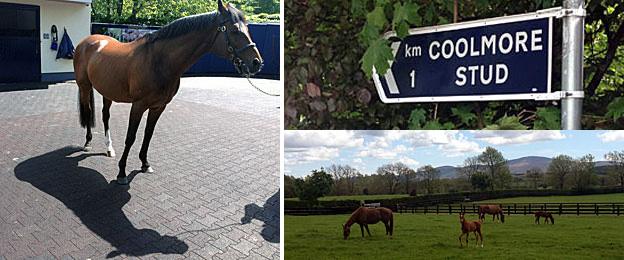
Galileo lives in a stable near other top stallions at the 3,500-acre Coolmore Stud in County Tipperary
In racing parlance, you breed from the best to be the best, and while it is an inexact science, chances of success are increased by the blueblood background of a sire whose father was the champion stallion Sadler's Wells, himself a son of the revered Northern Dancer.
"Frankel was a great son of Galileo's. Hopefully Australia might go some way to being as good or nearly as good as Frankel," he says,
"Like most sports it's a percentage game, and Galileo gets a higher percentage of good horses than other stallions. Obviously people are more attracted to his produce.
"In an athletic sense, he's terrifically well made and proportioned. Horses are athletes at the end of the day and he produces a huge amount of athletes."
Coolmore Stud, in 3,500 acres of prime limestone land perfect for rearing horses, is home to four winners of the Derby, the one-and-a-half mile race for three-year-old horses which was first run in 1780.
Galileo resides next to the 2011 scorer Pour Moi, and the victor of nine years previously, High Chaparral, is a couple of doors down.
From speeding at nearly 40mph during their racing careers, they now lead a more sedate experience - although they are called to the breeding shed up to three times a day, with a few hours' break in between.
"The breeding season runs from February to July. We are coming to the end of the peak season. The sun is shining, the grass is growing, it's peak fertility time and we are busy," says O'Loughlin.
In a period of about five months, Galileo will 'cover', or mate with, a total of 190 mares. Now aged 16, he already has a decade at stud under his belt, and could carry on for another 10 years or more if he remains fit and well.
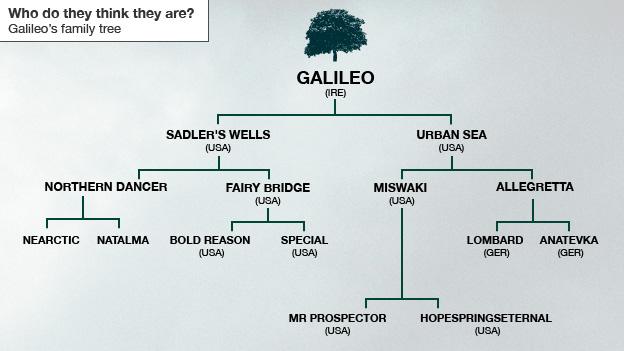
Galileo, born in 1998, is a son of sire Sadler's Wells (grandfather Northern Dancer) and dam Urban Sea
With Frankel, the Prince Khalid Abdullah-owned stallion, already reported to be worth £100m in only his second season at stud in Newmarket, one can only guess at Galileo's value. No wonder these horses want for nothing.
"They love it and every horse here has the ultimate care. They get the best feed, best attention, fantastic stables and facilities, best land in the world to graze on," adds O'Loughlin.
"They have a very pleasant and relaxed lifestyle. The stallions here are exercised every morning, they are well fed, have mares to cover, and get out into the paddocks at certain times of the year for downtime. It's a wonderful life for an animal, fantastic."
Attention to detail is paramount. Top vets are on hand in case of injury, security is tight, and rigorous steps are taken to guard against infection.
As you approach the stud from the small nearby town of Fethard, the hedges begin to take on a more manicured look. The navy blue branding of the Coolmore empire is everywhere - from the staff's jackets to the horse lorries and water buckets.
About 500 people work at the Irish headquarters of the operation, which also has stud farms in Kentucky, USA, and Australia's Hunter Valley.
In a serene courtyard of eight boxes, Galileo has distinguished younger equine neighbours such as Holy Roman Emperor and Mastercraftsman.
Stallion groom Robert Broderick says: "Galileo is a very quiet horse, he's very easy to handle. He's very professional in his job - that's what makes him so good in my eyes. He's just a gentleman to have anything to do with.
"As he was such a good racehorse, he continued that form, from his breeding and temperament, into the new job and he's transferred that on to his progeny as well."
A few hundred yards away in another impeccably kept horseshoe of stables is the 2012 Derby winner Camelot, who like Galileo was trained by Aidan O'Brien at his nearby Ballydoyle racing base.
As Camelot is led away from his box, the horse rears up, his forelegs rising into the air in what appears to be a mating call.
The multiple Group One winner settles down as it dawns he is out to meet some human visitors, and not mate with a high-class mare.
His new job is normally a brisk affair, the union over within a matter of minutes.
Some of the stallions' partners will be with mares owned by the Coolmore trinity of bloodstock guru John Magnier, and former bookmaking chiefs Michael Tabor and Derrick Smith.
Others are nominations - mares sent the long way to Tipperary by breeders from around the world.
Sums are usually paid on a no-foal, no-fee basis, with encounters timed to ensure births in the early months of the following year, as racehorses officially age a year for administration purposes on 1 January.
There's excitement and nerves in the air. O'Brien, whose four Derby winners include last year's hero Ruler Of The World, has indicated Australia is the best he has trained.
Down the road in Fethard - pronounced Feathered, population 1500 - the name of the Derby favourite is whispered with almost religious significance in Butler's sports bar.
On the same main street, which has several hostelries but no cashpoints, racing is a regular topic of conversation in McCarthy's bar - an inn described by one local as "so horsey, you might get a kick in there".
"There's a huge connection with horses in the area," says landlord Jasper McCarthy, leaning on a beer pump, with a framed picture of legendary former Ballydoyle trainer Vincent O'Brien on the wall behind.
"An awful lot of my family were involved with horses - my brother was a jockey, my father was a jockey, my grandfather was a jockey, and my granduncles and cousins.
"There is huge interest in Australia in the bar. People are talking about him and hoping he'll win the Derby. Everybody knows Galileo around here, as everybody knows Sadler's Wells as that's what Coolmore was founded upon."
Pictures of racing greats from down the years look down on us. This is not just a pub. There's a restaurant next door and an undertakers too. The business Twitter handle is 'winedinebury'.
"There's been lots of famous faces in over the years, everyone from Alex Ferguson to Andrew Lloyd-Webber to George Foreman, the Presleys, Michael Collins - you name them, they've been in here," adds McCarthy.
Back at Coolmore, racing's version of Gracelands, the hope is Australia or one of his three stablemates will have the necessary speed, stamina and balance to leave their rivals all shook up.
"Galileo is a son of Sadler's Wells, who was a great sire of sires. We are hoping Galileo will give us one of his sons to follow in his footsteps," says O'Loughlin.
"The Derby is a fantastic race. It's a stallion-making race. It's the blue riband of the turf and our efforts are very much targeted towards having the best chance we can have in it every year."
A quarter of Saturday's line-up of 16 horses are Coolmore-owned with Orchestra and Kingfisher also sons of Galileo, while their O'Brien colleague Geoffrey Chaucer is a descendant of the late stallion Montjeu.
Galileo has already fathered the winners of more than 100 Group races at the top level of flat racing, and the man who looks after him would be proud should another of his offspring triumph at Epsom.
"For one to win the Derby would be a huge bonus to continue the legacy at the home of champions," says Broderick.
- Published8 June 2014
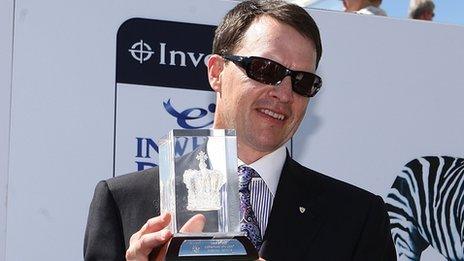
- Published12 May 2014
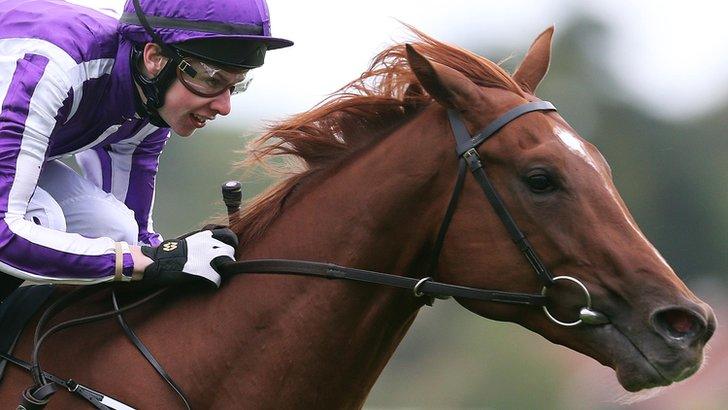
- Published1 June 2013
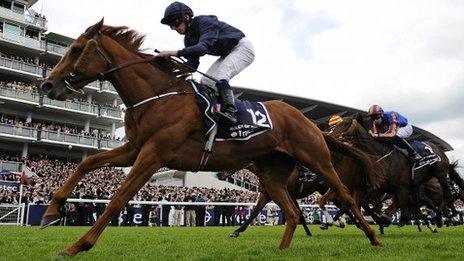
- Published18 October 2013
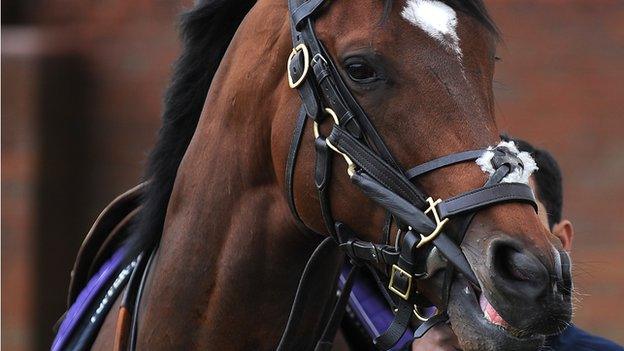
- Published21 December 2018
